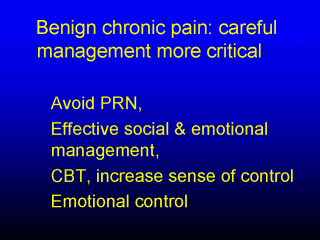| front |1 |2 |3 |4 |5 |6 |7 |8 |9 |10 |11 |12 |13 |14 |15 |16 |17 |18 |19 |20 |21 |22 |23 |24 |review |
 |
The management of benign chronic
pain is more critical. Analgesia needs to be more strictly controlled in order to avoid
upward “ratcheting” of dosage and analgesia strength (where patients gradually require
stronger and stronger doses of increasingly stronger analgesics to control static
(unchanging) pain. PRN (as patient requests) analgesia administration should not be used.
Instead, analgesia should be given by time, e.g. 4 or 6 hourly. There is a need for effective social and emotional management and psychological assessment and support needs to be sensitively used. Cognitive-Behavioural Therapy to increase a sense of control and graded exercise programmes to resist pain avoidance may be needed. Training in how to modify emotional responses in anticipation of pain is an important component of management. It is not sufficient to simply tell patients to keep their emotions under control, they must be given techniques by which this can be done and coached until they can do so. |